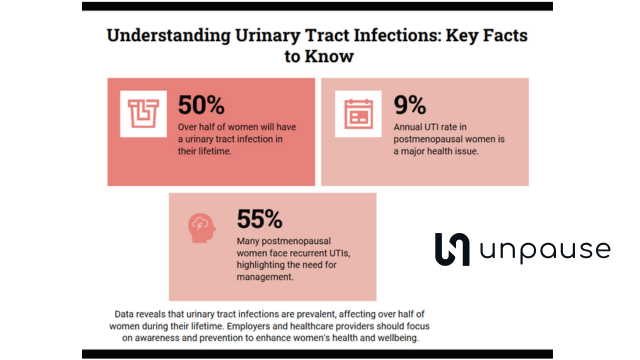During Menopause, can recurrent UTIs be a Sign Of Cancer?
December 19, 2024

Yes, recurrent UTIs can sometimes be a sign of cancer, although it is not common. Certain types of cancer, such as bladder cancer, kidney cancer, and prostate cancer, may present symptoms similar to a UTI, such as blood in the urine, pain during urination, or frequent urination. Persistent UTIs that do not resolve with treatment or recur frequently may raise concerns and warrant further investigation.
Urinary tract infections (UTIs) are common, occurring in over 50% of women at least once in their lifetime. Among postmenopausal women, the annual incidence of UTIs is approximately 9%. Recurrent UTIs are more prevalent in this group, with rates rising to 55% after menopause. While UTIs can typically be managed with antibiotics, recurrent cases may raise concerns about underlying health issues, including cancer.
While the connection between recurrent UTIs and cancer is not definitive, research and medical observations suggest that recurrent infections can sometimes indicate more serious conditions, such as bladder cancer. This article explores how recurrent UTIs may be linked to cancer, especially during menopause, the associated symptoms, and when to seek medical advice.
Understanding UTIs and Their Causes
A UTI occurs when harmful bacteria, typically E. coli, enter the urinary system and multiply in the bladder or urethra. UTIs are more common in women due to anatomical differences that make it easier for bacteria to enter the urinary tract. Symptoms of a UTI typically include:
- A frequent urge to urinate
- A burning sensation during urination
- Cloudy or strong-smelling urine
- Blood in the urine (hematuria)
Most UTIs are easily treated with antibiotics, but some individuals experience recurrent infections, which can cause frustration and concern.
Recurrent UTIs: A Closer Look
Recurrent UTIs are generally defined as:
- Two or more infections within six months, or
- Three or more infections within a year.
The majority of recurrent UTIs are caused by recurring bacterial infections or lifestyle factors such as sexual activity, improper hygiene, or dehydration. Other contributing factors may include kidney stones, an overactive bladder, or structural abnormalities in the urinary tract.
However, recurrent UTIs can sometimes indicate more serious conditions, such as bladder cancer. Bladder cancer, particularly squamous cell carcinoma, has been associated with recurrent UTIs, although the exact link is still under investigation.

Can Recurrent UTIs Indicate Bladder Cancer?
Bladder cancer symptoms often overlap with those of UTIs, complicating the diagnosis. Symptoms such as blood in the urine, difficulty urinating, and pelvic pain are common to both conditions.
However, certain differences can help distinguish bladder cancer from recurrent UTIs. For example, blood in the urine (hematuria) without other signs of infection, such as a negative urinalysis, may warrant further investigation.
Bladder cancer usually begins in the urothelial cells lining the bladder. Chronic irritation caused by long-term bacterial infections has been linked to an increased risk of bladder cancer. Despite evidence suggesting a possible link, bladder cancer remains relatively rare, especially in women, and most cases of recurrent UTIs are unrelated to cancer.
Risk Factors for Bladder Cancer
While recurrent UTIs might occasionally be an indicator of bladder cancer, other risk factors are more commonly associated with the condition, including:
- Smoking: The leading risk factor for bladder cancer, responsible for approximately 50% of cases.
- Age and Gender: Bladder cancer is more common in older adults, with men being at greater risk than women.
- Chronic Urinary Tract Infections: Long-term, untreated infections can irritate the bladder lining and increase the likelihood of developing bladder cancer.
- Chemical Exposure: Contact with certain chemicals, such as those in dyes and solvents, has been linked to bladder cancer.
Recurrent UTIs and Cancer Risk
Bladder Cancer
Recurrent UTIs can exhibit symptoms similar to those of bladder cancer, including blood in the urine (hematuria), frequent urination, and pain while urinating. Research shows that people with a history of recurrent UTIs may have a higher risk of developing bladder cancer. One study revealed that patients with recurrent UTIs had an adjusted hazard ratio of 4.96 for developing bladder cancer compared to individuals without UTIs. The similarity in symptoms frequently results in a delayed diagnosis of bladder cancer, which can affect treatment outcomes.
Kidney Cancer
Kidney cancer, much like bladder cancer, can present with urinary symptoms such as blood in the urine or ongoing back pain. Although it is less common, healthcare providers should be vigilant about kidney problems when patients experience recurrent UTIs. Studies have indicated a notable link between recurrent UTIs and a heightened risk of cancers in the renal pelvis and ureters.
Ovarian and Cervical Cancer
There is not much direct evidence connecting recurrent UTIs to ovarian or cervical cancers. However, pelvic cancers can put pressure on the urinary tract, which may resemble UTI symptoms. It's important for women who have recurrent UTIs to talk to their healthcare provider about any other symptoms to rule out these conditions.
Prostate Cancer
In men, prostate cancer can exhibit urinary symptoms that resemble those associated with UTIs. Ongoing urinary issues in older men should be thoroughly examined for possible prostate concerns.
Other Conditions
Recurrent UTIs can also be indicative of other serious health issues:
- Diabetes: Individuals with diabetes may experience recurrent infections due to higher sugar levels in urine, which can promote bacterial growth.
- Sexually Transmitted Diseases (STDs): Some STDs can cause urinary symptoms that mimic those of a UTI.
- Colon Cancer: While not directly linked, some studies suggest that colon cancer might lead to urinary symptoms due to its proximity to the urinary tract.
Symptoms and Diagnosis
Common UTI symptoms include:
- Frequent urination
- Painful urination
- Blood in urine
- Lower abdominal pain
If these symptoms persist despite antibiotic treatment or recur frequently, it is crucial to consult a healthcare provider for further evaluation. Diagnostic tests may include urine cultures, imaging studies, or cystoscopy to rule out underlying conditions such as cancer.
UTI and Hot Flashes
UTIs and hot flashes are frequently experienced during perimenopause, and they can sometimes exacerbate each other, leading to increased discomfort. Hot flashes, which are marked by sudden feelings of heat and sweating, can intensify UTI symptoms such as urgency and a burning sensation while urinating. The hormonal fluctuations during perimenopause, particularly the decline in estrogen levels, can compromise the urinary tract lining, making it more susceptible to infections. These hormonal changes also impact vaginal moisture and pH levels, further elevating the risk of UTIs. To manage both conditions, it's essential to stay hydrated, maintain good hygiene practices, and consider estrogen therapy if necessary, but it's crucial to discuss the best options with a healthcare provider.
Perimenopause and UTI
Perimenopause brings about hormonal shifts, especially a decrease in estrogen, which raises the likelihood of urinary tract infections (UTIs). With lower estrogen levels, the tissues in the urinary tract and vagina become thinner, making them more vulnerable to bacterial infections. Symptoms like vaginal dryness and urinary urgency can also intensify UTI discomfort. Furthermore, women in perimenopause might face recurring UTIs due to these hormonal fluctuations. To help prevent this, it's important to stay well-hydrated, consider hormone replacement therapy (HRT), and practice good hygiene. Regular medical checkups are essential for effectively managing both perimenopausal symptoms and UTIs.
When to Seek Medical Attention
Although most recurrent UTIs are not linked to cancer, it’s important to stay vigilant. Seek medical attention if you experience:
- Three or more UTIs in a year.
- Persistent symptoms, such as blood in the urine or pain, that don’t resolve with treatment.
- Unexplained weight loss, fatigue, or appetite loss.
A healthcare provider may recommend further evaluation, such as a cystoscopy (a procedure using a small camera to inspect the bladder), imaging tests, or a biopsy if abnormalities are found.
Conclusion
Recurrent UTIs are common and often caused by infections or lifestyle factors. However, when they persist or become frequent, they could signal a more serious issue, such as bladder cancer. Although the risk of bladder cancer is relatively low, it’s important to monitor your symptoms and consult a healthcare provider if you have concerns. Early detection and timely intervention can significantly improve outcomes. Don’t hesitate to seek medical advice if you experience persistent or concerning symptoms.










































